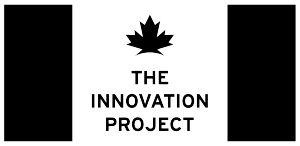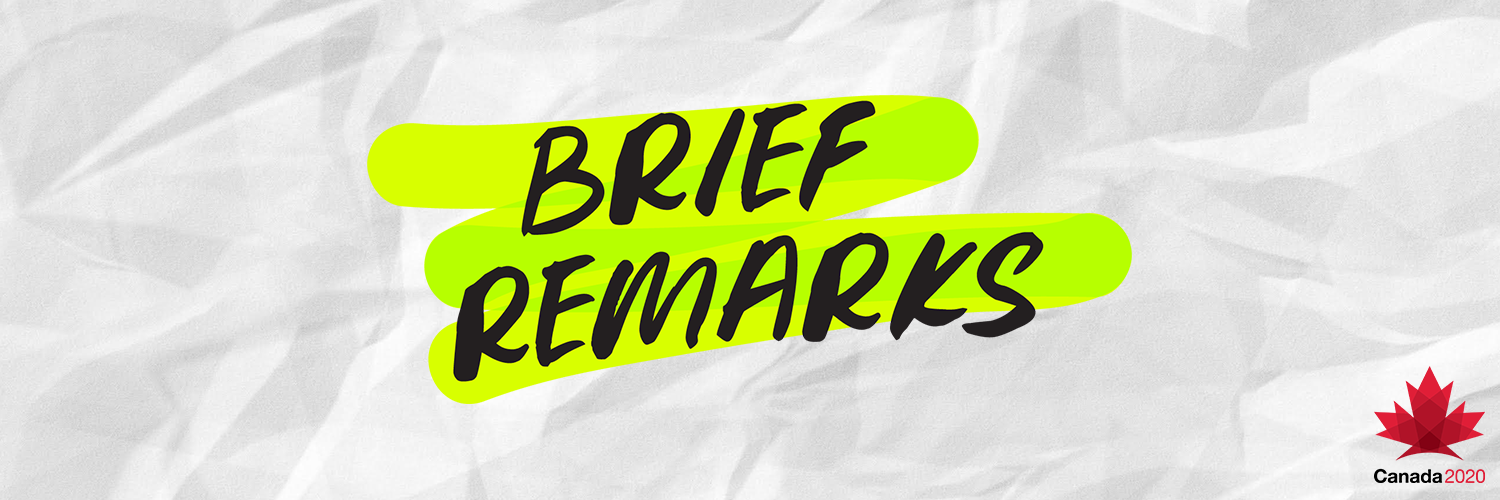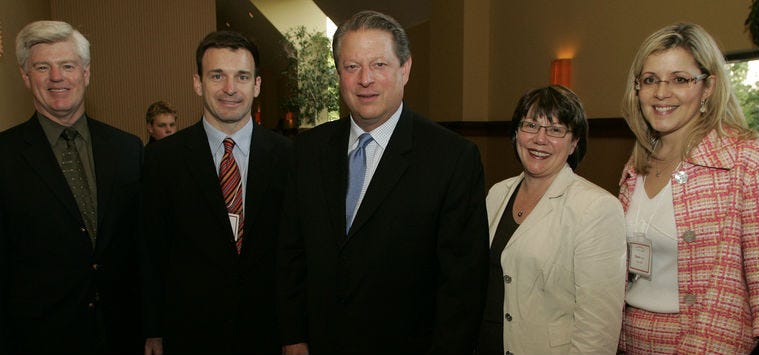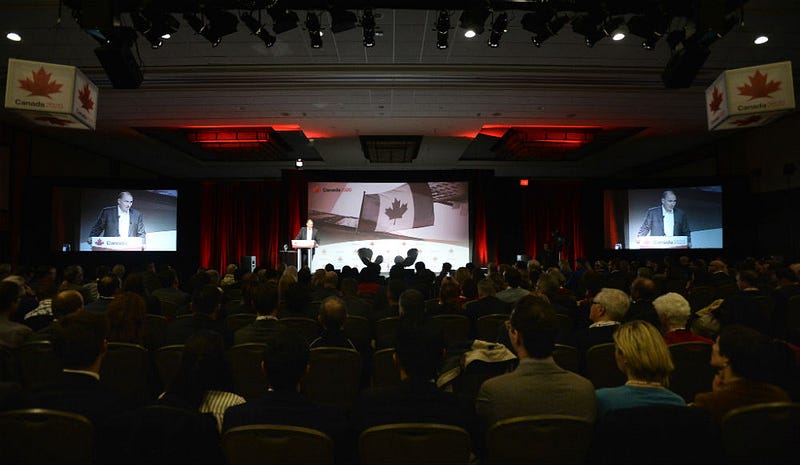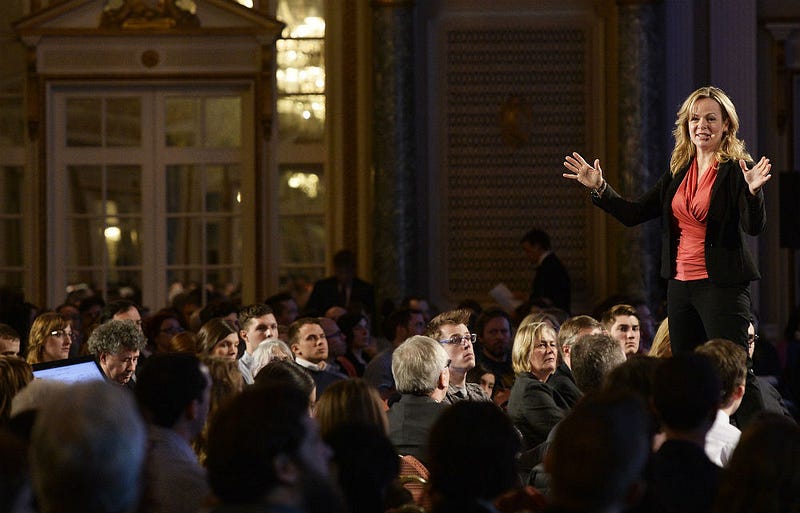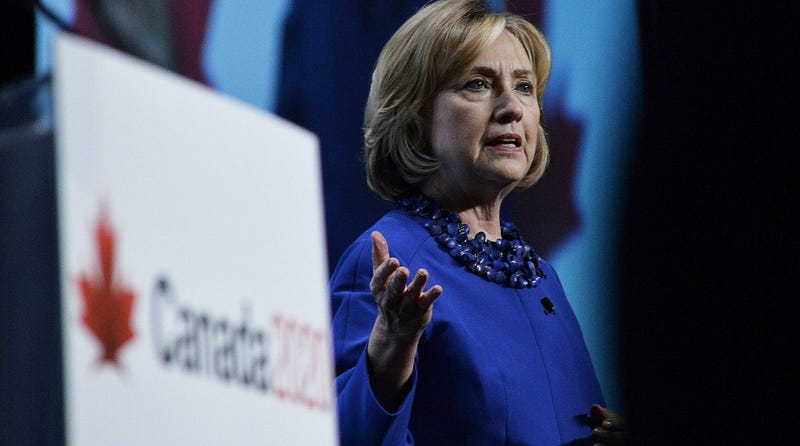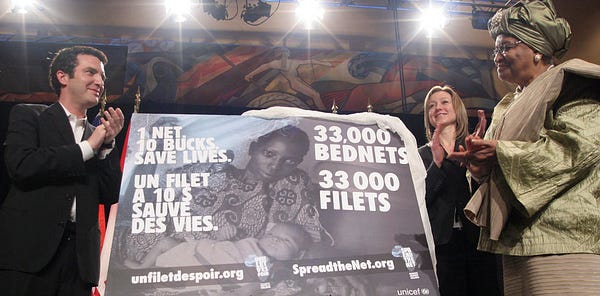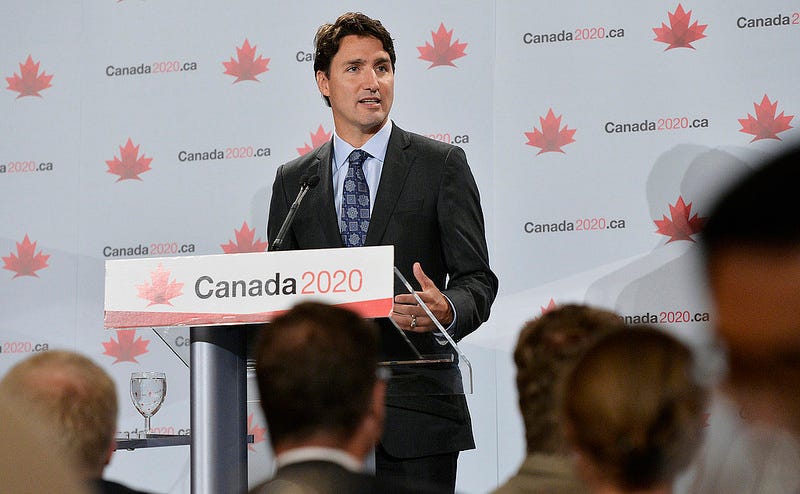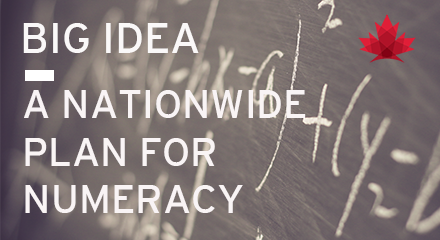
In June, Canada 2020 launched The Innovation Project, an initiative devoted to studying Canada’s innovation agenda – the risks, the opportunities, and key factors involved in making Canada a more innovative nation.
As part of this project, we asked Mike Moffatt, Senior Associate at Canada 2020 and Director at the Lawrence Centre at Western University’s Ivey Business School and Hannah Rasmussen, Director at Projection North and Professor at Western University’s Brescia College, to consider how to foster innovative growth in Canada.
Moffatt and the Canada 2020 team traveled to eight cities across Canada to hold roundtable discussions with key stakeholders representing sectors ripe for transformation. We are grateful for the thoughtful discussion and time these roundtable participants gave the effort. While the sectors themselves were very different, common themes emerged: talent and immigration, availability of venture capital and Canadians’ adversity to risk.
From their research and these roundtables, Moffatt and Rasmussen developed 10 Big Ideas for Canada. Canada 2020 will be releasing an idea a day on our website leading up to our 3rd Annual Canada 2020 Conference.
Each idea is thoughtful and detailed, and Canada 2020 hopes they will spur discussion and debate on the topic as we continue to explore innovation in Canada.
—
Big Idea: A Canada-wide Transformation of Numeracy Skills
What is the idea?
Numeracy skills affect an individual’s economic and social well-being. Inadequate numeracy skills can negatively impact an individual’s ability get a job and feel engaged and valued in society. Inadequate numeracy skills when possessed by larger groups can “hurt the economy through missed opportunities for innovation and productivity.”(1)
In 2012, the Conference Board of Canada found that 55 per cent of Canadian adults had inadequate numeracy skills. Also, inadequate numeracy skills are higher in marginalized groups, such as Aboriginal people in Canada and immigrants. A person with inadequate numeracy skills may be unable to function well in an innovative Canada as low numeracy skills are linked to “unemployment, low wages and poor health.”(3) Thus, poor numeracy is a massive challenge for Canada’s innovation agenda and our goal of encouraging economically inclusive innovations.
The goal for this big idea is to build on measures proposed and/or put in place by other countries struggling with the same numeracy issues in order to eradicate inadequate numeracy among adults and children, and to create more positive attitudes towards numeracy in Canadian society.
Part 1. Introduce numeracy skills in early childhood (before children are in formal education)
Numeracy skills must be introduced early in childhood for two reasons. First, it is important to promote the development of numeracy skills in early childhood to naturalize mathematical thinking and to identify students who are struggling as early as possible so that their acquisition of mathematical knowledge in school is not hampered. According to the Encyclopedia on Early Childhood Development, “1 in 10 children will be diagnosed with a learning disorder related to mathematics during their education.” (4)
Just as language skills are stressed early in a child’s life and any struggles are quickly identified and interventions implemented, we must do the same for numeracy skills. This leads to a series of sub-recommendations:
Recommendation: Provincial governments should share best practices on effective early childhood numeracy curricula.
Recommendation: Where needed, provincial governments should create an effective early childhood numeracy curriculum.
To ensure a child has numeracy skills, early childhood professionals need to be provided with evidence-based effective numeracy strategies, curricula and assessment tools. While there are suitable numeracy techniques for teaching children of this age, early childhood educators do not universally use them.(5) By creating a curriculum, and ensuring it is used in early childhood education, we can ensure that all children benefit from these techniques and are not left behind their peers.
Recommendation:Provincial governments should work together to create numeracy tools for parents to encourage engagement.
National Numeracy, a not-for-profit organization in the U.K., created a parental tool kit and website to encourage parental engagement in numeracy.(6) These brought together best practices and current materials for parents to use. Additionally, they created a tool kit that would help parents and schools provide positive messages about numeracy, opportunities and activities related to numeracy, and school tools to help schools develop parental engagement. We propose developing a similar Canada-wide set of tools that can help break down the barriers to numeracy.
Recommendation: Provincial governments should fund research into early screening measures and interventions and supports for problems in numeracy.
Dr. Daniel Ansari, the Canada Research Chair in Developmental Cognitive Neuroscience, reported that one of the main concerns in math education is that while we have reliable and valid early childhood screening measures for problems in language development and effective interventions and supports to deal with these problems, we have not developed the same screening measures and interventions and supports for problems in numeracy. Screening tools for identifying foundational numeracy competencies in preschool and kindergarten need to be developed and validated for use in schools, clinics and other educational settings. Interventions for children with, or who are at risk of, mathematics learning difficulties should be devised and evaluated through randomized controlled studies.(7)
Part 2. Create a system-wide numeracy culture within the education system(8)
Every teacher from early childhood educators to university lecturers must become a teacher of numeracy. That does not mean that every teacher must hold a math degree and be a math teacher but that numeracy — just like literacy — must be recognized as an intrinsic part of every subject.
This goal will take ongoing work to ensure that education systems in Canada have a cross-curricular approach to numeracy.(9) Many schools already recognize this and strive to achieve it, but the approach must become universal in Canada.
This leads to a series of sub-recommendations:
Recommendation: Expand the teaching of numeracy in bachelor of education programs.
Researchers into math education have identified the need for more time to be spent in bachelor of education programs on numeracy teaching approaches, identification of children struggling and numeracy interventions. By including more work on numeracy, the programs will help new teachers incorporate numeracy into all subjects. This recommendation echoes a similar call for more teacher education in numeracy teaching approaches by the OECD in their 2004 report on the role of math education in innovative societies.(10)
Recommendation: School boards should allocate more professional development time for practicing teachers to focus on numeracy teaching approaches, identification of children struggling and numeracy interventions.
Part 3. Create a new adult numeracy core curriculum
Recommendation: Provincial governments should create an adult numeracy curriculum that will be disseminated through local health units and other appropriate places such as public libraries and job placement offices.
The goal of this is to ensure that adults have opportunities to develop and refresh their numeracy skills.
It will include numeracy programs in: further and adult education; the workplace and programs for the unemployed; prisons; and community-based and family numeracy programs. It will assist teachers to meet the individual needs of adults through the selection and teaching of skills appropriate to those adults’ needs.
Good numeracy is essential for parents to help their children learn, to understand health information and to make informed decisions throughout our lives. Research in the U.K. has shown that improving adult numeracy directly contributes to an increase in the personal and social confidence of the people with improved numeracy.(11)
Part 4. Data collection and evaluating numeracy approaches
Recommendation: Provincial governments should require the collection and sharing of depersonalized data to evaluate testing, intervention and instruction approaches for numeracy education throughout childhood.
Given the decentralized nature of our education system, there is no single agency or institution responsible for evaluating instruction approaches. In most Canadian provinces and territories, schools can set their own policies for student assessment and most principals use student assessment data for making decisions about students, monitoring their school’s progress or identifying aspects of instruction or the curriculum that could be improved. With some variation across the provinces and territories, students in Canada take provincial or territorial standardized summative examinations at key stages of their education, especially at the end of secondary education.(12) Different school boards and specialists use different measurement tools to identify children presenting numeracy problems and use different interventions based on these different tools.
Dr. Ansari noted in his interview that the schools are very good at collecting data, but the use of a large number of different instruments and a lack of access to the data means that researchers are unable to compare instruction and intervention approaches. This lack of standardization results in a lack of evidence-based interventions.
This lack of comprehensive and comparable data to evaluate instruction and intervention approaches can hinder policy development and analysis and is a barrier to improving Canadian students’ math skills. Using the data will help in three ways: to develop and identify appropriate measurement tools and interventions for numeracy problems, to measure the success rate of various interventions and to develop a consistent and evidence-driven program.
What mechanisms for accountability or measurement can be put in place for the idea?
In 2012, Canadian students did reasonably well on the Programme for International Student Assessment (PISA) math test. Students’ math skills were assessed on a six-level scale, with level 6 being the strongest skills and level 1 the weakest. In 2012, 35 per cent of Canadian 15-year-olds scored at a level 2 or lower.
Based on the results, the Canadian Conference Board assigned Canada a grade of B with only four countries (Japan, Switzerland, the Netherlands and Finland) receiving an A grade.
However, when this data was broken down, researchers highlighted some concerning trends.
First, there is a growing number of Canadian students with “inadequate” math skills. In 2012, this number was 34 per cent, up more than four per cent from three years previous.
Second, there is a growing achievement gap, with more students scoring in the lowest levels and fewer students scoring in the top levels.
Third, when this data is examined at the provincial level, there are alarming provincial differences. Quebec earned an A+, British Columbia earned an A, Ontario, Alberta and Saskatchewan earned a B, New Brunswick, Nova Scotia and Newfoundland earned a C and Manitoba and Prince Edward Island earned a D.”
Canada will continue to participate in these tests, and implementing our recommendations will help reverse these concerning trends.
Also, part of the mandate for this idea will be to create robust measurement tools for both early childhood numeracy and adult numeracy.
What failures is the idea trying to solve?
Thin Markets: By ensuring that Canadian adults have “the ability to access, use, interpret and communicate mathematical information and ideas to engage in and manage the mathematical demands of a range of situations in adult life,” (13) this big idea will ensure that there is more talent available to the cluster. The increased pool of talent will make each cluster both stronger and bigger.
Inequality of Opportunity: Large groups of Canadians are being denied opportunities because they do not have the math skills needed to compete in the 21st-century economy. Specifically, this idea will help to address the inequality of opportunity for marginalized groups, such as new immigrants and Aboriginal
Canadians. Both groups have been identified specifically by the Conference Board of Canada as having inadequate numeracy skills, which may negatively impact their participation in innovation. (14)
What are the potential benefits of the idea and what are the costs?
Benefits: In its 2004 report on the role of math education in innovative societies, the OECD notes that one of the main goals of math education is to empower people with the ability to “pose, solve and interpret mathematical problems in a variety of situations,”(15) with the goal of applying these skills in innovation. Without citizens with strong math skills, the OECD argues that innovation will lag behind as people struggle to understand and incorporate numerical information. These strong math skills start with a strong numeracy foundation.(16)
Transforming Canada’s numeracy skills will help to solve the labour shortage failure Canada is experiencing.
At the moment there are jobs that need to be filled and people who need jobs, but the people don’t havethe right skills. By transforming Canada’s numeracy skills, we can fill these jobs and have people ready to fill new jobs as they are created.
Costs and Risks: There is a risk that the provinces and school boards do not participate in the goal to transform numeracy. A lack of political support for this goal would make the goal much more challenging to achieve.
Will the idea increase economic inclusion and/or enhance autonomy? If so, how?
Economic Inclusion: The Conference Board of Canada reports that “Inadequate numeracy skills hurt individuals’ potential for landing jobs and promotions and hurt the economy through missed opportunities for innovation and productivity.”(17) By transforming Canada’s numeracy skills, individuals will be able to participate in the economy.
Autonomy: Low levels of numeracy are linked to unemployment, lower wages and poor health. By transforming Canada’s numeracy skills, individuals will be able to improve their quality of life and make well-informed personal choices.
Footnotes
1 Conference Board of Canada, “Adults with Inadequate Numeracy Skills,” Conference Board of Canada Website (2014).
2 National Numeracy, Manifesto for a numerate UK (2014).
3 Jeff Bisanz, “Numeracy: How important is it?” Encyclopedia on Early Childhood Development, (2011).
4 Jenni Connor, “Being Numerate,” The Early Years Learning Framework – Professional Learning Program (2011).
5 National Numeracy, Final Report: Parental Engagement Project (2015).
6 Nancy C. Jordan, “Early Predictors of Mathematics Achievement and Mathematics Learning Difficulties,”
Encyclopedia on Early Childhood Development (2010).
7 Ontario Ministry of Education, Supporting Numeracy (2012).
8 Ontario Ministry of Education, Supporting Numeracy (2012).
9 Zemira Mevarech and Bracha Kramarski, Critical Maths for Innovative Societies, OECD (2014).
10 National Numeracy, Why is numeracy important? (2016).
11 OECD, Education Policy Outlook: Canada (2015).
12 OECD, OECD Skills Outlook 2013: First Results from the Survey of Adult Skills (2013).
13 Conference Board of Canada, Adults with Inadequate Numeracy Skills (2014).
14 Zemira Mevarech and Bracha Kramarski, Critical Maths for Innovative Societies, OECD (2014).
15 National Numeracy, Why is numeracy important? (2016).
16 Conference Board of Canada, Adults with Inadequate Numeracy Skills (2014).

